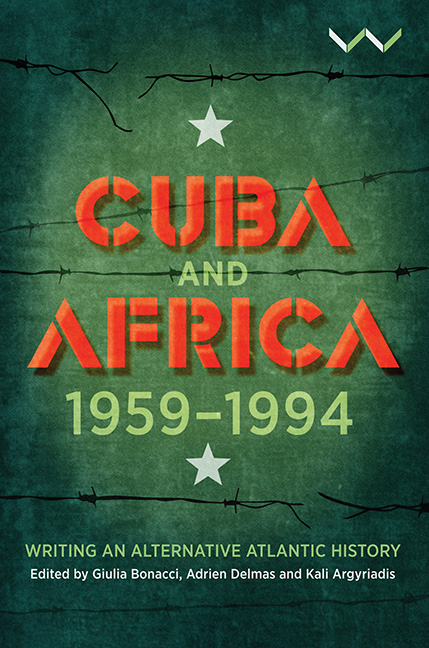Book contents
- Frontmatter
- Contents
- Figures and Table
- Foreword
- Acknowledgements
- Acronyms and Abbreviations
- Timeline of Historical Events
- Map of Africa, 1994
- Introduction Reconfiguring the Cuba–Africa Encounter
- Part I Politics and Solidarity
- Part II Trajectories
- Part III Voices
- Part IV Reconstructing History, Reconnecting Roots
- Contributors
- Index
Introduction - Reconfiguring the Cuba–Africa Encounter
Published online by Cambridge University Press: 15 June 2021
- Frontmatter
- Contents
- Figures and Table
- Foreword
- Acknowledgements
- Acronyms and Abbreviations
- Timeline of Historical Events
- Map of Africa, 1994
- Introduction Reconfiguring the Cuba–Africa Encounter
- Part I Politics and Solidarity
- Part II Trajectories
- Part III Voices
- Part IV Reconstructing History, Reconnecting Roots
- Contributors
- Index
Summary
The relations between Cuba and Africa took shape rapidly after the Cuban Revolution of 1959, at a time when the struggles for African independence were at their height. In a world marked by the Cold War, these relations set the stage for new forms of international solidarity that still remain misunderstood. Admittedly, the Cuban presence in Africa was but one of several theatres of Cuban internationalism, from Latin America to Asia, of which the Tricontinental conference and the creation of the Organisation of Solidarity with the Peoples of Asia, Africa and Latin America (OSPAAAL), in January 1966, represented the high points. But the intensity and especially the consequences of Cuban engagement on the African continent make these features distinctive. Following the 1959 revolution, there was an immediate rapprochement with African revolutionary and independence movements, and succeeding years opened a new era in the centuries-old history of Atlantic relations. Cuba's engagement in Africa was conducted in the name of ‘principles, convictions and blood’, as Fidel Castro, its principal instigator, pronounced in 1975, and took so many different forms – political, military, social, educational, economic, medical, humanitarian, cultural, linguistic, and so on – that it seems presumptuous to attempt a complete account. Without making any claim to exhaustiveness, this book seeks to outline this half-century between Cuba and Africa and to suggest an initial overall view.
Nelson Mandela's homage to Cuba, delivered at Matanzas, Cuba, in 1991, the year after his release from an apartheid prison, reminds us of the strength of a link that for decades nourished imaginations all over the continent:
We have long wanted to visit your country and express the many feelings that we have about the Cuban revolution, about the role of Cuba in Africa, southern Africa, and the world. The Cuban people hold a special place in the hearts of the people of Africa. The Cuban internationalists have contributed to African independence, freedom, and justice, unparalleled for its principled and selfless character.
In the words of South Africa's first black president, Cuba participated, more than any other nation, in the decades of struggle for African independence and the definitive ousting of colonialism on the continent. The outlines of this involvement in the anti-imperialist armed struggle are well known.
- Type
- Chapter
- Information
- Cuba and Africa, 1959-1994Writing an Alternative Atlantic History, pp. 1 - 26Publisher: Wits University PressPrint publication year: 2020

